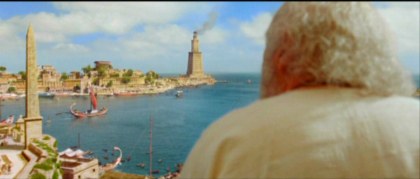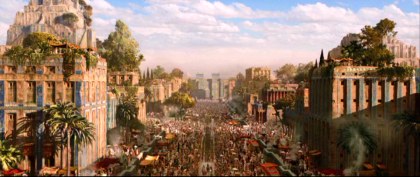"ALEXANDER RIVALS MONTY PYTHON FOR SURREAL LEVELS
OF FARCE"
-BBC-
This is a biopic about Alexander the Great, or
simply Big Al, as I like to call him. (Or Big Paddy, as I should
probably call him, since he and everyone around him apparently spoke
with Irish accents.)
It was
a mega-bomb of astronomical proportions.
- Made for $155 million, it grossed $34 million.
- American critics scorned it. British critics
found it unworthy of their scorn, and ridiculed it instead.
- It was nominated for six Razzies.
At the top of his game, Oliver Stone is a great
filmmaker, but this movie is just so jaw-droppingly bad in so many
ways that it should be used as the official screening criterion in film
criticism societies. Any critics who gave this a good review should be called in front of their peers and
have their pencil broken over their editor's knee, in the manner of that
opening
scene in "Branded." The most irritating
thing about the film is the sequencing. Scott Weinberg of
efilmcritic.com had the point exactly right:
"You
could literally chop Alexander up into six 30-minute blocks,
reassemble it at random, and the movie would make the exact same
amount of sense (i.e. none)."
The film follows the same pattern again and again: there's totally boring
chit-chat and background for about a half an hour, followed by a scene where you are
finally starting to get involved, and then - just as something is
finally about to happen - followed by a word slide that says "ten
years earlier, in Babylon" or "2300 years later, in Pennsylvania"
- or whatever - thus changing the story's focus and assuring that you will never at any time
actually be interested in what is going on. Every time that
happens, you can almost hear Tom Servo saying, "Meanwhile, in
another movie."
That was the deal-breaker, the one element which
secures the film's place as bad cinema in a serious conversation.
On the other hand, who cares about serious conversations? There
are other, more entertaining elements which place it in the realm
of so-bad-it's-almost-good.
- The accents are crazy. Colin Farrell chose
to play Alexander with his natural Irish accent. Jared Leto, who
does not normally have an Irish accent, decided to adopt one since
that seemed to be the official way to represent ancient Macedonians. Others
in the cast followed suit. All non-Macedonians (Angelina Jolie,
for example), to demonstrate that they are foreign speakers, talk
like Borat.
- It's hard to believe it, but I've now watched
this film three times because there are three distinct versions. The
theatrical film is 176 minutes long. If you prefer,
you can get Oliver Stone's 167 minute "director's cut." Most
film versions bearing that particular appellation are longer than the theatrical
cut, but Stone felt the film was better shorter. I'm sure he was
right, but this raises the question of why, if Stone now likes the
film better nine minutes shorter, he just didn't cut it that way
in the first place. Did the MPAA pressure him to put scenes in?
(Technically, he took out about eighteen minutes of the
theatrical footage and added in some ten minutes of
different footage, if you really care about such minutiae.) There
is a full-length commentary on the DVD, and that may answer the
question, but I am not about to watch this movie again to find
out. If you're really a glutton for punishment, you can try to
survive Stone's "Final Cut," which was issued three years after
the theatrical run, and is 214 minutes long. It includes
everything. Not just everything shot for this particular movie,
but every scene ever filmed for every movie in the history of
color photography. Seriously, it has everything from both of the
other cuts plus another 30 minutes or so of additional footage,
with all the scenes re-ordered once again. I can't really offer an
opinion about whether the final cut improved the film. My sense
was that it did flow better, but I fast-forwarded through all the
scenes I had already seen, so I really didn't get any sense of the
whole film in context.
- The sets are sometimes downright ludicrous. There
is no doubt that Oliver Stone knows how to get a big, lush.
expensive look up there on the screen, but the result in this case
is that the entire film looks totally artificial. Most scenes look
exquisitely beautiful and colorful - far too beautiful to
represent life in 320 BC. It's all clean and sanitized and
perfectly art-decorated and gaily-colored, until it no longer
looks like the actual film of Alexander the Great, but a nice
well-scrubbed Disney ride based on the film. There is very little
grit to it. Everyone has gorgeous teeth. The colors are vivid.
Everything sparkles. As Movie Juice pointed out: "Anthony
Hopkins
wanders about his terrace as minions water scores of obviously
plastic plants amidst a selection of statues that look barely
authentic enough to stand in your local Chucky Cheese."
Actually, it looked to me as if he was standing in my local garden
center, shopping for faux-classical statues.
-
Ol' Hannibal Lecter is supposed to be playing Ptolemy
I, and he has a beautiful garden palace overlooking the Alexandria
harbor, with a great view of
the famous lighthouse. One problem with that is that the film
shows the lighthouse burning a fire on a sunny day. (It did use
the fire at night, but provided illumination with mirrors in sunlight.)
The far greater problem is that Ptolemy is looking out over a
scene which could only have been seen after his death. Ptolemy
conceived the lighthouse, but it was not completed and functioning
until the reign of his son, Ptolemy II, who dedicated it as a
memorial to his parents. The film therefore pictures Ptolemy
looking out over his own memorial. (Pictured below left.) And it sure
doesn't look all that spiffy for a newly-built (or not-yet-built) monument which was
said to be covered in white marble. As shown here it looks like a
grungy brown factory from post-Dickensian London.
- There is no real sense of dialogue. Oliver
Stone really wanted to present the facts correctly, and many
individual scenes required a great deal of background information,
so that was covered with conferences in which Alexander and his
henchmen discussed all the technical issues. "Now you, valiant
Oneguy, hold the center just long enough until staunch Otherguy,
oh, brave, brave Otherguy, hero of a thousand combats, can turn
his column ... etc " The transitions between scenes and the
overall narrative continuity were handled by a framing device in
which an old Ptolemy (Tony Hopkins) looks back on Big Als' life
and narrates to the camera, basically reciting either a history
lesson or purple prose. ("I have known many great men, but only
one Colossus. Thank Zeus, because I don't know the plural of
Colossus. Is it Colossi or Colossuses or Colossopods or what?
Somebody look that up and get back to me.") When the tedious
background information has all been conveyed, the remaining talk
is stagy
speechifying, even in the love scene. Big Al says to his bride on
their wedding night, in the middle of a semi-rape: "A man searches
for a woman at the top of the world, and finds her," in the spirit
of "Ron Burgundy is down, and it's bad." The bride and groom were
supposed to be alone at that point, but I was expecting her to
turn around to see whom he was speaking to.
I could go on to mention the obvious problems,
but why bother? Everybody has noted that Big Al's mom is the same
age as he, and looks younger. Everyone has already noted that Alexander is a
whiny talk-too-much bitch. Why did they need macho Colin Farrell
for the role? As it is written here, Paul Giamatti would have been
better, or better yet Andy Dick, who already had the right hairstyle. Are there positives? Yes, there
were a few things I liked.
- The opening credits are beautiful and
elegant.
- The musical score by Vangelis is appropriate
for the epic scope of the story.
- Val Kilmer brought some weight to the role of
Philip of Macedon, Big Al's dad. (In more ways than one. He
gained fifty pounds.)
- The aerial shots of the big battle scene are
both
spectacular and useful, in that we are able to see the
strategies employed by massive armies moving into their various
formations.
- Some of the other battle footage is
impressive, especially the parts with exotic animals in combat.
- The march into Babylon (below right) looks
kind of impressive in a Roger Rabbit, "humans performing in
front of cartoon backdrops" kind of way.
Given the sweep and majesty of the project, or
at least the attempt at it, it is
probably worth your while to rent the Alexander Final Cut DVD if
you love the big epics. The
blessing of the DVD format is that you'll be able to see all of
those spectacular elements and fast-forward through everything
else, because it is just so-o-o-o long. The supreme irony of the
project is that Alexander himself died
so young that he would not have had time to watch this movie.
|


